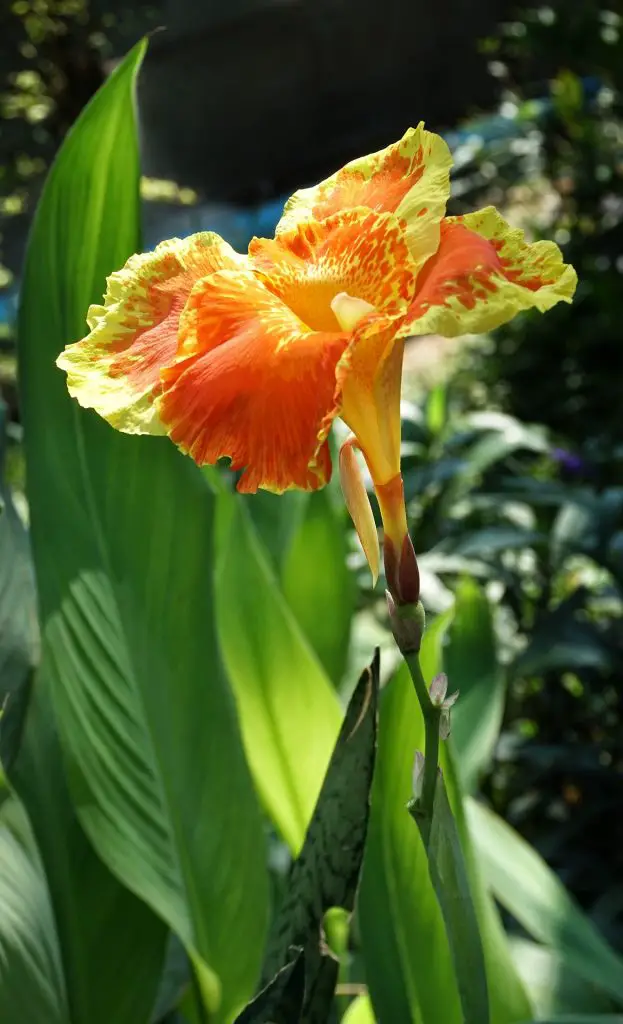Is Canna Lily Deer Resistant? And How Can You Protect Them? Canna lilies are one of the most popular plants that you can put into the garden. For those people that live in a cooler region, it can give you that tropical feel because of the lush foliage and beautiful flowers. However, if you live in a region with a large deer population can you safely plant canna lilies?
Canna lilies are considered relatively deer resistant and are rated by the New Jersey Agricultural Experiment Station as being a plant that is “seldom severely damaged”. This is the second-highest rating given by that website which indicates that while it is not a deer’s favourite food it is also a plant that they will occasionally have a nibble on as such you need to provide some protection.
To protect your plant from any damage the best way is to exclude the deer entirely from your garden using a fence that is at least 7 ft tall. The reason that the fence has to be relatively tall is that deer are well renowned for being excellent jumpers Academic research has shown that they can comfortably clear a 6-ft fence and some animals can even get over a 7 ft fence, however, that is relatively rare.
As such it is generally recommended that you erect an 8 ft fence to ensure that they cannot get over it. However, for many people erecting a fence around their property of that size is impractical and also very expensive, so what are the other options.

How To Keep Deer Out Of Your Garden
There are things that you can do to the structure of your garden that can help to keep deer out before you need to resort to using repellents. The first thing that is important is to ensure that those plants that are most susceptible to the deer eating them should be placed close to the house and ideally not in the line of sight of any animals approaching from neighbouring properties.
Planting them close to your house will provide some degree of deterrence as your day to day activities will ensure for at least some of the day that the deer are not hanging around that area. Additionally, if the deer cannot easily see the plants they really like to eat they will be less inclined to enter the property in the first place. To get a list of those plants which are most appetizing for deer visit the New Jersey Agricultural Experimentation Station website as they provide a thorough list of plants.
The second thing that you can also do is actively select plants that deer do not like to eat and either plant them between the more favoured plants or fill the outer parts of the property with these plants. Personally, I think that planting the majority of the deer-resistant plants at the outer part of the property works best.
In terms of the plants that they like, as a general rule, deer will not eat plants that are highly fragrant, poisonous, or thorny. However, this is not a hard and fast rule and I would suggest that you check each and every plant that you intend to plant in the garden to make sure of their deer status. An example of this is that deer will eat roses even though the plant is relatively thorny.
Aside from the structural changes that you can make to your garden you can also employ deer repellent devices which include chemical repellents and mechanical devices.

What Is The Most Effective Deer Repellent System?
Generally speaking, chemical repellent systems tend to work better than mechanical ones such as motion-activated sprinklers, ultrasonic devices, and things like Predator eyes (devices that look like the eyes of predators)
However, not all of these chemical repellents are equally effective. Academic research has shown that those repellents which are designed to induce fear into the deer are significantly more effective than other repellents which are designed to affect the taste or smell of the plant.
The repellents that are fear-inducing are typically based upon things like coyote urine, blood, and also putrefied egg. Putrefied egg emits sulfur-based compounds that mimic the compounds emitted by common predators of the deer which is why it works.
However, even the most effective repellents have a limit on how long they will last. Academic studies again have shown that these repellents will typically only be effective for approximately 10 to 12 weeks. After that period the deer will become acclimatised to the smell and begin to feed normally. To read more about this click here.
As such we recommend purchasing more than one deer repellent and rotating its use throughout the year. The two repellents we recommend are deer out and plantskydd which is available on Amazon. To see the latest prices click on the links.
The reason we recommend these two particular repellents is because they are both fear-inducing repellents that are based on different active ingredients and therefore will produce different smells.

Mechanical Deer Repellents
While there are not nearly as many studies on mechanical devices designed to repel deer it is apparent that they are not as effective as chemical repellents. Studies carried out have shown that the feeding patterns of deer usually are unaltered by the presence of these devices even when additional responses are added such as lighting.
As such we would only recommend that you use motion-activated sprinklers as one part of your deer defence and use them sparingly throughout the year. They should ideally be moved around the garden and turned on and off throughout the year. The motion-activated sprinkler system we would recommend is called the Orbit 62100 Yard Enforcer and it features a 40 ft detection range and 120 degrees view.
In terms of other devices that are on the market such as ultrasonic devices and predator eyes they are generally considered to be quite ineffective. There has been numerous studies carried out on ultrasonic devices which have found that they have no impact upon deer or any other animal.
Predator eyes is something where there is very little academic research on their performance, however, when I have looked at some of the reviews of the products and also videoes on the effectiveness of these eyes in real time against deer the results are pretty poor.
One of the reviews had a night vision camera showing deer standing next to the predator eyes eating the plant that they’re supposed to be protecting. I, therefore, recommend you don’t buy a product of this nature because I don’t think it will be effective at all.
I hope you found this article useful and are able to successfully grow canna lilies in your garden without deer coming along and eating them. If you have any questions or comments please leave them in the section below.
Relevant Articles
Does Deer Repellent Really Work? (All The Answers Based On Academic Research)
Do Coffee Grounds Keep Deer Away?
Is Lavender Deer Resistant? Can You Use Them To Protect Your Garden
